When shopping for your next contact center software, you may consider Twilio for its flexibility and customization.
Twilio offers a composable solution that allows you to turn on what you need and skip over the rest. But at what cost?
You can also choose to use Twilio Flex, a more traditional contact center solution with fewer DIY pieces and more predictable user pricing. Twilio has bundled its most popular channels and features and built a “digital engagement center” subscription-based product.
In this blog post, we’ll discuss Twilio’s pricing and plans in depth. Then, we’ll compare them to one of the leading cloud-based contact center options so you can decide which is truly best for your business.
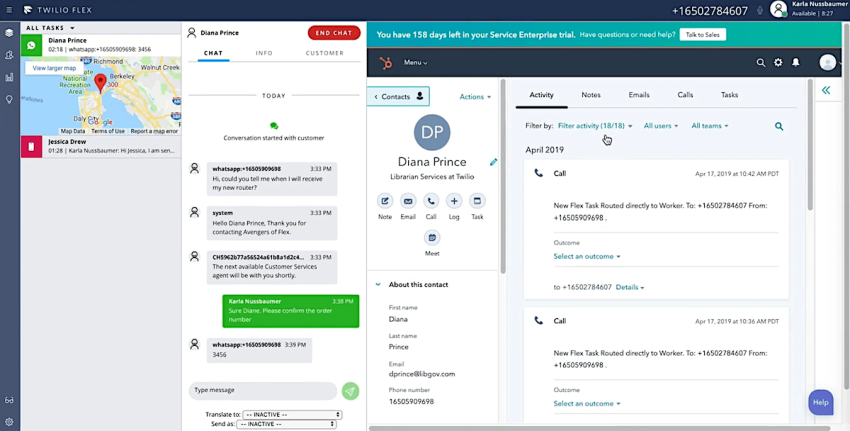
Twilio Flex Pricing Explained
To understand Twilio’s pricing, consider how you want to pay for your contact center services. If you’re starting from scratch and creating your own solution, you can choose from usage-based or per-month billing. In Twilio Flex, you can choose from per-hour or per-month pricing.
Compared to other call center tools, Twilio is unique. Contact center pricing is most commonly listed per month, including all the features available within a provider’s license.
The lower end of the price range for contact center solutions is around $50 per user per month. Adding more communication channels and premium features can increase monthly per-user prices to more than $200.
Launch your contact center without the engineering costs.
Nextiva keeps it simple with clear pricing and all the tools you need — no surprises, just great service.
Twilio’s two main pricing options
The allure of Twilio lies in its DIY composable contact center. Here, Twilio favors pay-as-you-go pricing. For example, you can expect to pay $0.014 per minute for a voice call and $0.0042 to send a WhatsApp message.
Enterprise contact centers typically favor per-month pricing as it locks in discounts for volume and usage commitment.
However, small and medium businesses may benefit from per-unit pricing. Unless you handle a volume of calls that outpaces your staffing levels, you may struggle to hit a usage commitment threshold.
| Per-Unit Pricing | Per-Month Pricing |
|---|---|
| Suitable for small and medium businesses | Suitable for high-volume contact centers |
| No usage commitment | Usage commitment |
| Ideal for minimum channel use | Ideal for bundling channels |
| Expensive for enterprises | Expensive for low-volume contact centers |
Per-unit pricing
Twilio breaks down its pricing per channel. Each send or receipt in a particular channel comes at a cost.
However, before you start to calculate usage, you must purchase new phone numbers or port your existing ones (e.g. to send messages or receive calls).
Using SMS as an example, your options for number hosting are as follows:
| Purchasing New Numbers From Twilio | Porting Existing Numbers to Twilio | |
|---|---|---|
| Long Codes | $1.15 per number per month | $0.50 per number per month |
| Toll-Free Numbers | $2.15 per number per month | $0.50 per number per month |
| Random Short Codes | $1,000 quarterly plus setup | N/A |
| Vanity Short Codes | $1,500 quarterly plus setup | $500 quarterly plus setup |
Once you’ve calculated how much it will cost to host your numbers with Twilio, you can make the best guess based on your existing or projected usage.
The table below provides a per-unit (voice call, SMS send, WhatsApp send, etc.) cost, which you can use to calculate your potential charges.
| Channel | Per-Unit Cost |
|---|---|
| Programmable Voice (Outbound Calls) | $0.0140 |
| Programmable Voice (Inbound Calls) | $0.0085 |
| SMS | $0.0079 |
| MMS (Outbound) | $0.0200 |
| MMS (Inbound) | $0.0100 |
| $0.0042 |
In addition to these base-level channel prices, you should also consider the costs of extra features. For example, the programmable voice price is for just the call. You’re not including functionality like call recording, conference calls, or transcription.
Twilio per-unit discounts
You may reach an automatic discount threshold if you have a high volume of messages or calls. For example, if you send 150,000 SMS messages, your next 150,000 will receive a $0.002 discount.
As you pass higher thresholds, the discount increases by $0.002 each time. This may not sound like much, but it may be the game changer if you’re making a high number of calls or sending tons of messages.
If you host over 1,000 numbers with Twilio, you also qualify for a discount on per-month number rental fees. This varies per product.
Per-month pricing
Twilio’s per-month pricing is dependent on your usage commitment.
If you’re a high-volume customer who uses all the channels in the Twilio arsenal, this may represent good value. However, smaller businesses that don’t take advantage of the entire stack may feel short-changed.
Let’s say you’re a Twilio customer for SMS only. For $0.0079 per message, you’d need to send or receive 18,988 messages for a return on your fee of $150 per user per month compared to per-unit pricing.
The benefit of Twilio Flex pricing
At this point, you may be feeling overwhelmed. It’s a lot to take in.
That’s exactly why you should consider Twilio Flex. This pricing model is much simpler.
| Per Hour | Per Month |
|---|---|
| $1 per active user hour | $150 per named user |
| Pay for what you use | Pay for the security net of a top spend threshold |
| Ideal for temporary and seasonal staff | Ideal for long-term budgeting |
Much easier, right? You also get a free trial.
Free trial
Twilio offers a free trial of 5,000 active user hours. This means you can fully test out the pros and cons of Twilio Flex without spending a cent.
Of course, there are restrictions on what you can do here. Access is limited to base functionality across the entire Twilio portfolio.
For example, if you wish to use AI tools like Agent Copilot and Unified Profiles, you will be charged $0.045 per minute for both Twilio Flex and the DIY model.
Extra Cost Considerations
Despite looking like a pure-play SaaS offering, Twilio Flex does include some one-off costs.
Implementation costs
The USP behind Twilio’s technology is its custom development. However, setting up such a unique environment requires an extra upfront investment.
While Twilio doesn’t advertise its setup fees (they change from one deployment to the next), you should consider them when planning for a new contact center rollout.
If you have bespoke plans for your contact center, expect the figure to be in the $10,000s rather than $1,000s.
Twilio notes that the following builds are custom for each Flex deployment:
- Self-service, such as automating your interactive voice response (IVR) options
- Routing strategy
- User interface design
- Integrations and API/SDK work
Integration costs
Integrating Twilio Flex with CRM systems like Salesforce or ERP systems like Oracle might incur extra expenses, depending on the complexity and the systems used.
While some out-of-the-box integrations exist, Twilio leans heavily on its Twilio Communication Partners to deliver custom projects.
Think of this as a professional services charge for integration on top of your original implementation.
Launch your contact center without the engineering costs.
Nextiva keeps it simple with clear pricing and all the tools you need — no surprises, just great service.
Key Features & Functionalities
Twilio Flex provides extensive phone system features and customization options, allowing businesses to tailor workflows, user interfaces, and communication routing according to specific needs.
Twilio Flex includes:
- Voice
- Digital channels (SMS, Facebook Messenger, WhatsApp, WebChat, in-app chat, email, and video messaging)
- Low-code IVR builder
- Routing engine
- User interface framework
- Out-of-the-box reports
You also get access to supervisor tools like:
- Real-time and historical reports
- Team and agent status
- KPI dashboard and custom metrics
- Agent evaluations
For developers, where Twilio Flex really comes into its own, you get:
- JS/React UI framework
- Visual workflow builder
- Plugins dashboard
- Flex debugging
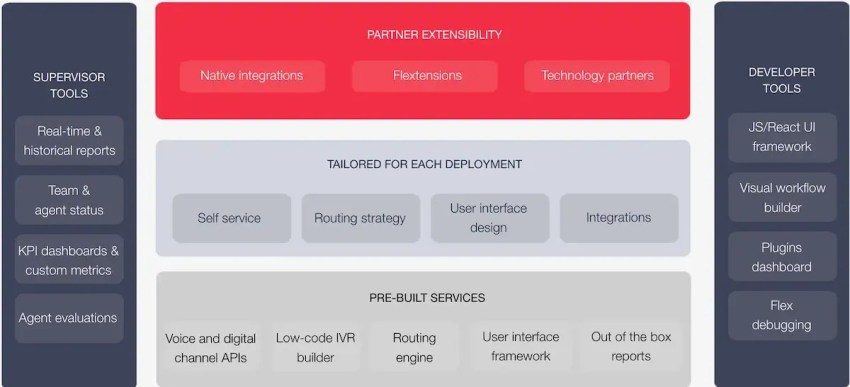
With this customizable feature set, it’s easy to see why customers with extremely narrow requirements opt for Twilio Flex. It has more predictable pricing and most of the flexibility of Twilio’s core composable solution.
However, for those with less of a need for customization, it’s often overkill.
Why Contact Centers Prefer Nextiva Over Twilio Flex
When it comes to CCaaS, the majority of businesses prefer an out-of-the-box solution. You get the predictability of a set per-user cost and can work out your total spend for the next three, five, or 10 years.

There’s less setup (and less cost for setup) as almost everything is ready to go for you. Let’s examine the main reasons customers choose Nextiva over Twilio Flex.
Comprehensive bundles
Nextiva offers bundled omnichannel packages that include voice, video, SMS, and email communications, which reduces the complexity and cost compared to Twilio’s a-la-carte pricing.

For a single license that’s easy to deploy, you can roll it out to all your contact center agents without complex planning.
Agents can access a single user interface for everything they need to provide a great customer experience.
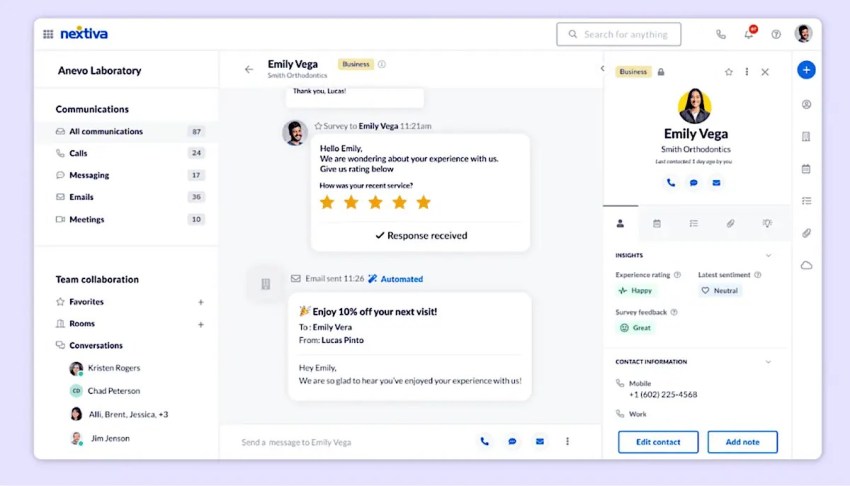
Predictable pricing
Nextiva’s contact center plans start at $75 per user per month, so you can establish your contact center with plenty of room to grow.
The only variables are staffing numbers and call costs. Even then, you can make an estimate based on historical reporting.
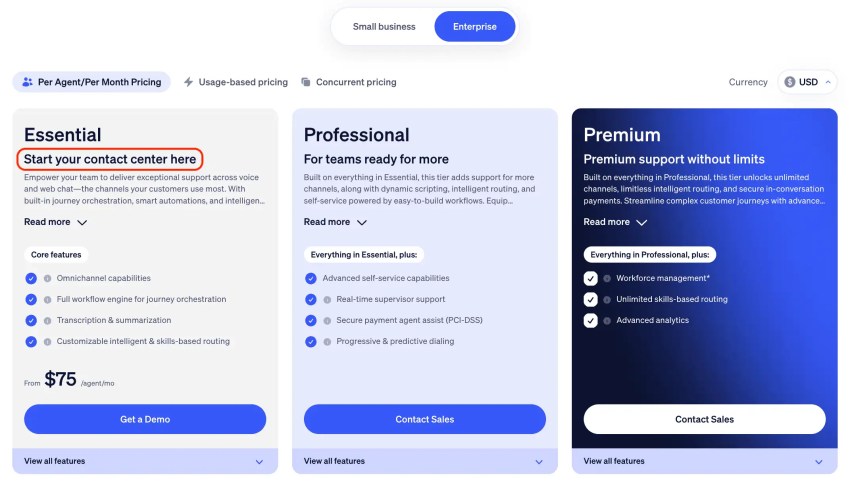
Included features
As a “done-for-you” contact center license, and even in Nextiva’s entry-level call center license, you get a feature-rich plan for your agents.
Expect features like:
- Omnichannel capabilities
- Smart automations
- Auto attendants
- Full workflow engine for journey orchestration
- Transcription & summarization
- Skills-based call routing
- Call queueing
- Call recording
- Post-call surveys
- Voicemail-to-email
- Website chat engagement
- Dashboard and reports
- Contact center agent assistance
These are all included in the core license cost. When it comes to Twilio Flex pricing, and certainly in the Twilio DIY model, you may have to pay for extra integrations or add-ons, depending on your consumption model.

User-friendly interface
Unlike Twilio’s “create your own interface” approach, Nextiva offers a ready-made, user-friendly interface that simplifies setup and ongoing management.
Agents can start using Nextiva without any training, thanks to extensive user adoption testing carried out over many years. Supervisors and admins also get simple tools to perform critical tasks like changing business hours, adding temporary queue messages, or changing the options on your IVR.
Even when you’re on the move, you get a mobile app to do the basics. The drag-and-drop approach is a favorite with customers who don’t have the time to undertake extensive training.
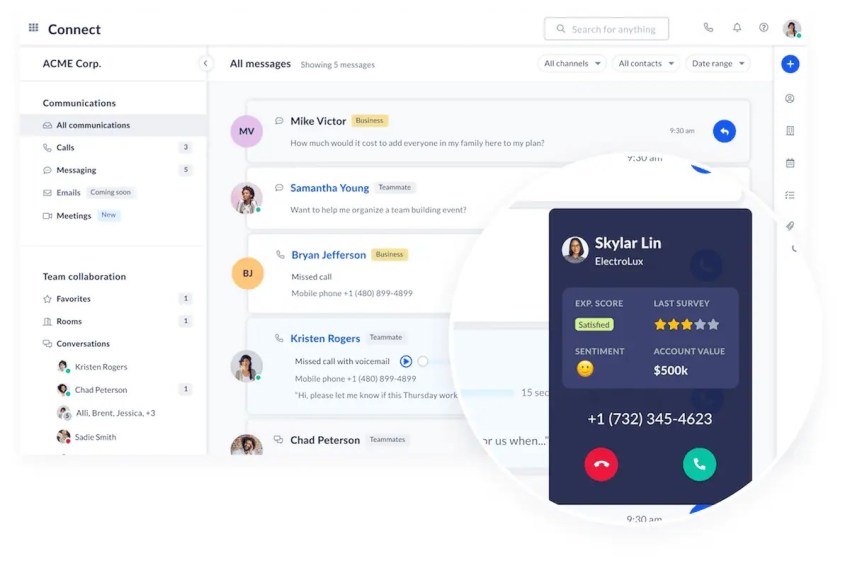
Unified communications
As well as providing an award-winning contact center, Nextiva excels in VoIP and unified communications (UC) solutions. This means you can integrate your voice, video, and team messaging in one platform, looking after internal communications.
What’s more, the seamless integration between UC and contact center apps means agents have instant access to back-office users and subject matter experts.
Every time an agent needs second-line support, documentation, or supervisor escalation, the single-app approach shows non-agent statuses; they can send instant messages without needing to place their caller on hold.
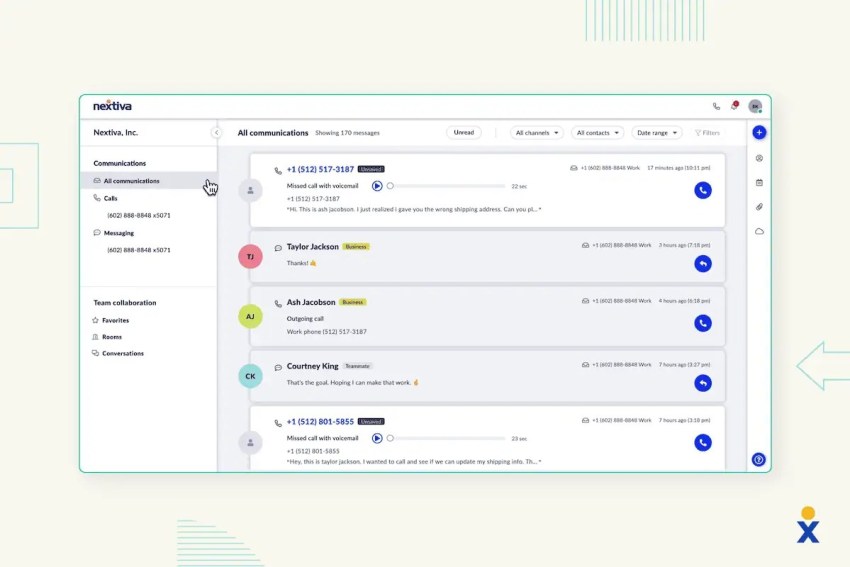
Switch to Nextiva Contact Center
Scale customer support and double your team’s productivity and efficiency.
Customer support
Both the Twilio sales teams and support teams can be challenging to communicate with.
These may be one-off scenarios, but they didn’t leave a great taste in the mouth for some users. A frustrated user recounted their experience trying to resolve a billing issue with Twilio. They were bounced back and forth between the sales and support teams, each claiming the issue was outside their purview.
The user was left on hold for extended periods and received conflicting information, leading to further frustration and delays in resolving their problem. This experience highlights the difficulties users can sometimes face when navigating Twilio’s support channels.
Despite Twilio’s reputation as a leading communication platform, customer service can be a pain point for some, with issues such as long wait times, lack of clear communication, and difficulty getting a resolution.
Let’s look at Trustpilot reviews to gather a larger scale of opinions. The score reflected worse than my personal experience. A meager 1.2 out of 5 stars doesn’t paint a pretty picture.
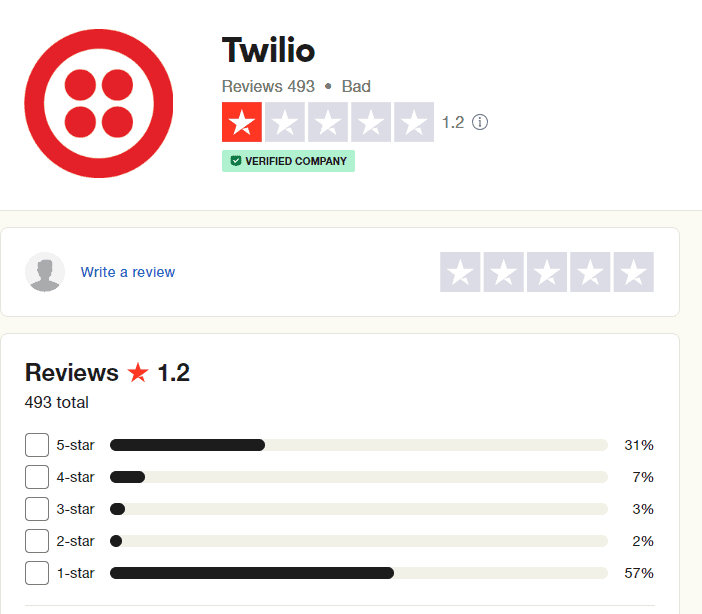
Source: Trustpilot
Twilio Flex Is Fine for Developers, But…
You have a better alternative available for your CCaaS platform. You don’t have to write any code or undertake a year-long engineering effort, either.
Twilio’s technology is programmable, which is desirable for large teams with big dreams. Twilio developers and customers have great technology at their disposal, but if something goes wrong, you may have trouble getting the help you need.
Nextiva Contact Center offers rivaling technology, superior support, and better value for businesses needing to add or replace their contact center software.
When considering the enticing costs of Twilio Flex pricing, think about the bigger picture, too.
Launch your contact center without the engineering costs.
Nextiva keeps it simple with clear pricing and all the tools you need — no surprises, just great service.


















 Customer Experience
Customer Experience 









